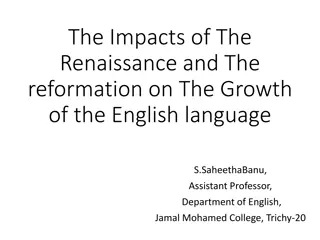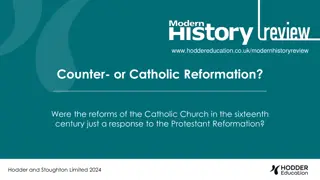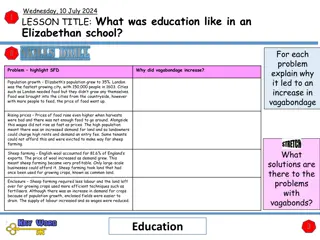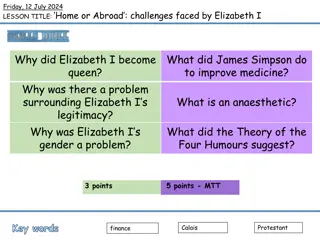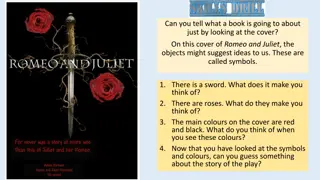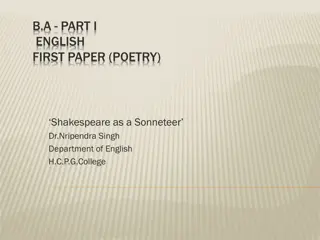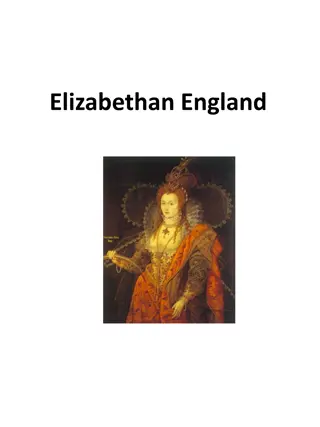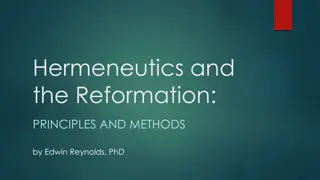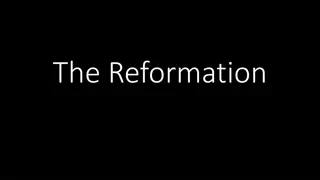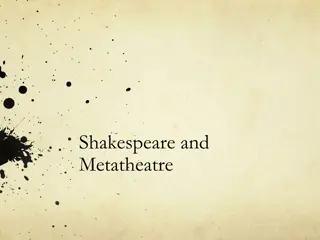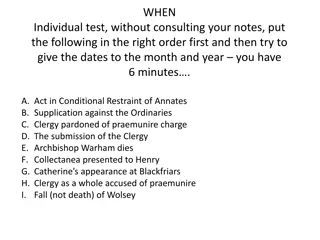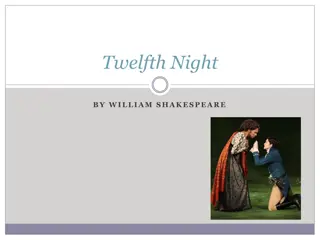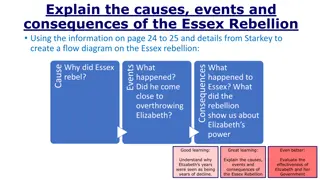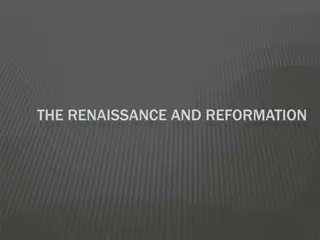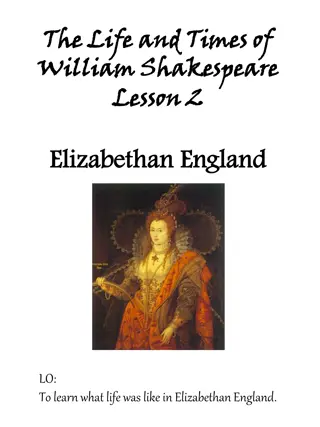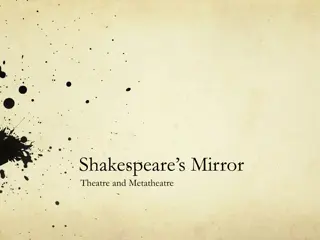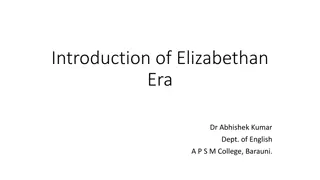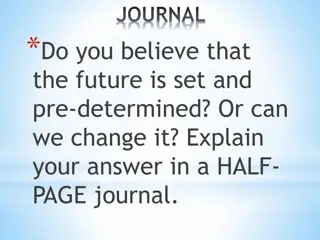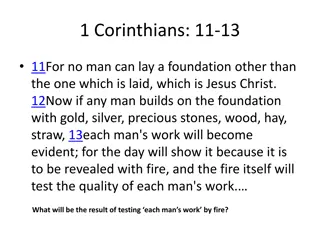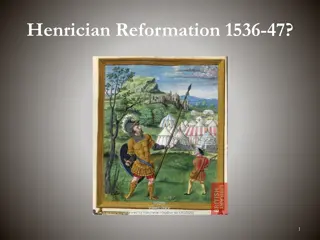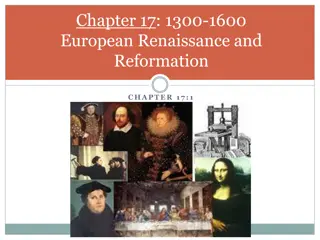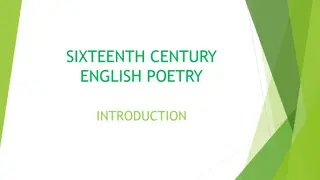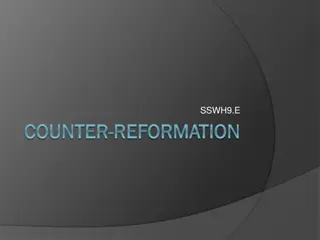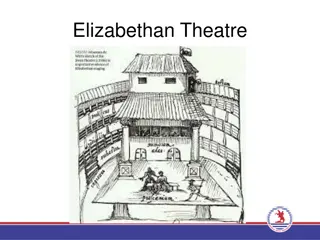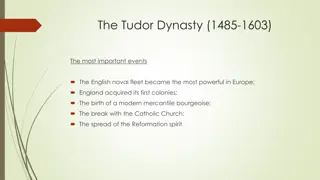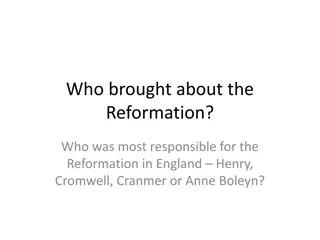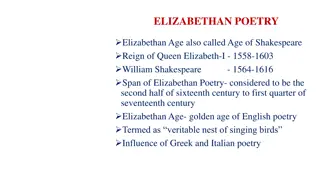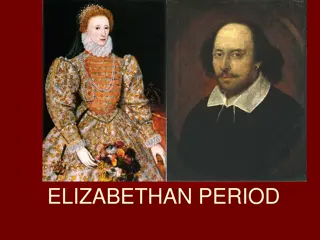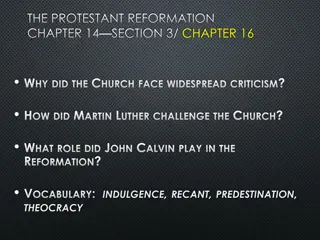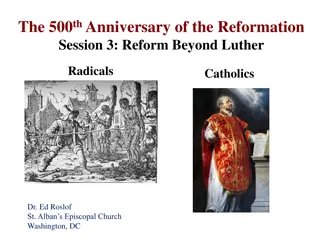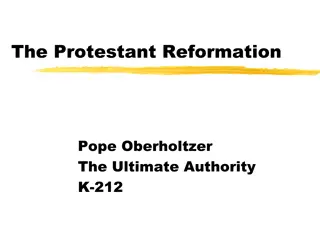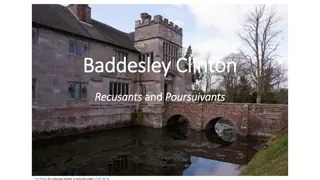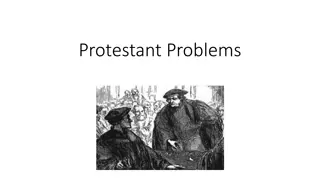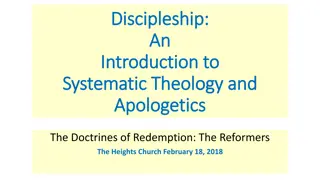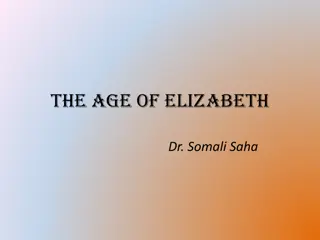Influence of Renaissance and Reformation on English Language Growth
The Renaissance and Reformation had significant impacts on the English language with changes in vocabulary, standardization of language, and spelling, influenced by Latin and religious terms. The Renaissance introduced Latin words, while the Reformation led to the translation of the Bible into Engli
5 views • 5 slides
The Protestant Reformation: Martin Luther and Key Points of Lutheranism
The Protestant Reformation led by Martin Luther in Germany during the 16th century was a religious movement that challenged the authority of the Catholic Church, giving rise to Protestant Churches. Luther's 95 Theses criticized the sale of indulgences and initiated reforms. Key causes included cleri
4 views • 16 slides
Influence of Renaissance and Reformation on English Language Growth
The Renaissance, starting in Europe, and followed by the Reformation, had significant impacts on the growth of the English language. The influx of Latin words, changes in vocabulary, growth of a standard language, and establishment of new coinages are some key outcomes. The Reformation, in particula
2 views • 5 slides
Counter- or Catholic Reformation?
The debate surrounding the Catholic Reformation questions whether it was a self-initiated response to internal factors or a reaction to the Protestant Reformation. Historians differ on when reform truly began, with some arguing it started before Luther. Key questions include whether the Catholic Chu
0 views • 18 slides
Education in Elizabethan England: Understanding the Impact on Vagabondage
Explore the educational landscape of Elizabethan England and its effects on societal issues like vagabondage. The content delves into the challenges faced in schools, the reasons behind the increase in vagabondage, and potential solutions to address these issues.
1 views • 7 slides
Challenges Faced by Queen Elizabeth I and Medical Advancements in History
Explore the challenges encountered by Queen Elizabeth I, including issues with legitimacy, gender, and threats from abroad. Learn about the pivotal role of James Simpson in advancing medicine with the introduction of anaesthetics. Discover the intricacies of Elizabethan government and the notable tr
0 views • 11 slides
Symbols and Facts: Uncovering Shakespeare and Elizabethan Theatre
The analysis begins by exploring the symbols present on the cover of "Romeo and Juliet" such as the sword and roses. It then delves into distinguishing facts from opinions regarding Shakespeare's life, touching on key events like his baptism, marriage, and career. Additionally, it provides insights
0 views • 26 slides
Elizabethan Religious Settlement: Unity Amidst Division
Amid religious division in England, Queen Elizabeth I implemented a Religious Settlement in 1559 to unify the country. The settlement, a blend of Protestant and Catholic elements, aimed to maintain peace and prevent rebellions. Elizabeth's strategic compromise pleased most people, though lingering t
0 views • 14 slides
Shakespeare's Sonnets: Treasures of Elizabethan Poetry
Shakespeare's sonnets, considered precious pearls of Elizabethan poetry, were written primarily in 1594 under the patronage of the Earl of Southampton. Divided into sections addressing a young man and a Dark Lady, they explore themes of love, beauty, and passion with a unique perspective. Despite be
0 views • 8 slides
Life in Elizabethan England: A Glimpse into Stratford
Explore the vibrant streets of Elizabethan towns like Stratford, where markets thrived and malting was a prominent industry. Discover the grid pattern of streets, the devastating fires, and the Bard Tavern's menu offering a taste of the era's culinary delights. Learn about the town's governance by t
0 views • 18 slides
Hermeneutics and the Reformation: Principles and Methods
The Protestant Reformation aimed to reform the Church by emphasizing biblical teachings over church tradition. It challenged the authority of the Roman Catholic Church and upheld principles such as Sola Scriptura, Sola Fide, Sola Gratia, Solo Christo, and Soli Deo Gloria. These principles emphasized
0 views • 31 slides
The Impact of the Reformation on European History
The Reformation brought significant changes to theology, religious institutions, and culture in Europe. Reformers like Martin Luther and John Calvin criticized Catholic abuses, leading to new interpretations of Christian doctrine. The Catholic Counter-Reformation and conflicts among religious groups
1 views • 4 slides
Shakespeare and Metatheatre: Exploring Elizabethan Theatre Anxiety
Explore the Elizabethan anxiety surrounding the theatre during Shakespeare's time, as highlighted by Philip Stubbes and Sir Philip Sidney. The text delves into concerns about the immoral influence of plays and interludes, portraying a vivid picture of the societal apprehensions towards theater and i
0 views • 38 slides
The Reformation Parliament and the Break with Rome
The Reformation Parliament played a crucial role in enforcing the break with Rome through various key statutes, such as the Act in Restraint of Appeals in 1533. This pivotal legislation not only granted Henry VIII the power to decide marriage cases within the realm but also made a radical statement
4 views • 12 slides
Insights into Shakespeare's "Twelfth Night
Explore the origins of Shakespeare's "Twelfth Night" and its characters in Elizabethan comedy. Delve into the historical context of the play, Shakespeare's life, and the universal appeal of his works in Elizabethan England.
0 views • 16 slides
Understanding the Essex Rebellion and Elizabethan Decline
Explore the causes, events, and consequences of the Essex Rebellion and evaluate its impact on Elizabeth and her government, shedding light on why the final years of Elizabeth's reign were viewed as a period of decline. Delve into societal changes, living standards, and cultural advancements during
0 views • 20 slides
The Renaissance and Reformation in Italy: A Historical Overview
The Renaissance and Reformation in Italy marked a period of rebirth and transformation between 1350 and 1550. The Italian Renaissance saw a resurgence of interest in ancient Greek and Roman cultures, characterized by urban growth, secular viewpoints, and a focus on individual ability. City-states li
0 views • 91 slides
Insights into Elizabethan Beliefs in Shakespeare's "Hamlet
Act 1, Scene 1 of "Hamlet" introduces characters and Elizabethan beliefs like ghostly encounters, the power of Latin to exorcise spirits, and the constraints of ghosts. Horatio's skepticism evolves, validating ghostly apparitions for the audience. The scene contrasts superstitions, hierarchy, and ed
0 views • 8 slides
Life in Elizabethan England: Insights from Stratford Upon Avon
Discover the bustling streets of Elizabethan towns like Stratford, market days, and significant events like fires and civic regulations. Explore the daily life and challenges faced by the residents during this historical era.
0 views • 5 slides
Elizabethan Theatre Concerns and Metatheatre Reflections
The Elizabethan era was marked by concerns about the moral influence of theatres. This period saw the establishment of new buildings like The Theatre and The Curtain. Philip Stubbes criticized the theatregoers' behavior, highlighting perceived vices portrayed in plays. Similarly, Sir Philip Sidney d
0 views • 40 slides
Insight into the Elizabethan Era: Queen Elizabeth's Reign
The Elizabethan Era under Queen Elizabeth's reign marked a transformative period in England, characterized by a shift from darkness to light in various aspects of English life. Queen Elizabeth's dedication to England and her inspiring patriotism brought about unity and national greatness, amidst rel
0 views • 9 slides
The Concept of Fate and Free Will in Elizabethan Worldview
The Elizabethan worldview, shaped by the Great Chain of Being, believed in a predetermined order where everything had a fixed place. This belief in divine hierarchy influenced societal structure and interactions, emphasizing responsibilities and consequences. The idea of disrupting this order leadin
0 views • 31 slides
Development of High Entropy Alloy-Based SOFC Anode for Controlled Reformation
Development and testing of a High Entropy Alloy-based Solid Oxide Fuel Cell (SOFC) anode for controlled reformation to improve thermal performance, reduce carbon deposition, and enhance durability. The project involves fabricating cells, electrochemical testing, modeling reformation rates, and scali
0 views • 32 slides
Criticisms and Challenges to the Pre-Reformation Church
Various forms of anti-clericalism and criticism were directed towards the pre-Reformation church. Hieronymous Bosch's "The Haywain" and Chaucer's Canterbury Tales depict cynicism towards corrupt church officials. The Richard Hunne case highlighted Erastian anti-clericalism, while Simon Fish's "A Sup
0 views • 22 slides
Henrician Reformation of 1536-47 - Overview of Key Terms and Influences
The Henrician Reformation of 1536-47 was a period of religious change in England, involving shifts in beliefs, worship practices, and organizational structures. This reform was driven both from above, by rulers imposing changes, and from below, with support from ordinary people. Key terms such as Re
0 views • 24 slides
European Renaissance and Reformation: A Time of Innovation and Transformation
The European Renaissance and Reformation period from 1300-1600 was a time of significant change and progress in art, learning, and religion. The Renaissance brought about a rebirth in art and human potential, with a focus on secular achievements and the support of patrons. Meanwhile, the Reformation
0 views • 29 slides
Overview of Sixteenth Century English Poetry and the Renaissance
The introduction provides insights into sixteenth-century English poetry, the Renaissance era, and the defining characteristics of the period. It delves into the intellectual, religious, political, and social contexts of the time, highlighting key figures and movements like the Reformation, the Grea
1 views • 12 slides
Reformation and Counter-Reformation in the Catholic Church
Catholic rules during the Middle Ages granted immense power to the Pope, sparking dissent that led to the Protestant Reformation. The Counter-Reformation was the Catholic response to Protestant criticisms, leading to the Council of Trent in the mid-16th century to reaffirm Catholic doctrines and pra
0 views • 14 slides
Insights into Elizabethan Tragedy and Classical Influence in Drama
Explore the world of Elizabethan theatre, the influence of classic Latin drama, and the evolution of tragedy from the 16th century to modern times. Learn about the elements of tragedy, the shift in tragic heroes from kings to middle-class individuals, and key concepts like hamartia, nemesis, and cat
0 views • 7 slides
The Tudor Dynasty (1485-1603): Key Events and Figures
The Tudor Dynasty (1485-1603) marked significant events in English history, including the rise of the powerful English naval fleet, acquisition of colonies, birth of the mercantile bourgeoisie, break with the Catholic Church, and spread of the Reformation spirit. Economic changes saw the transition
0 views • 5 slides
Key Players and Events in the English Reformation
Explore the key figures and events that shaped the English Reformation, including Henry VIII, Cromwell, Cranmer, and Anne Boleyn's roles in the break with Rome. Analyze the significance of Katherine of Aragon's refusal to accept divorce, Cromwell's influence, and Henry VIII's desires. Evaluate why A
0 views • 6 slides
Insights into Elizabethan Poetry: A Glance at the Golden Age
The Elizabethan Age, also known as the Age of Shakespeare, during Queen Elizabeth I's reign from 1558 to 1603, marked a golden era in English poetry. This period saw a flourishing of poetic forms influenced by Greek and Italian poetry. Major poets like Edmund Spenser, Sir Philip Sidney, and William
0 views • 6 slides
The Flourishing Elizabethan Period in English Literature
The Elizabethan period, characterized by the reign of Queen Elizabeth I, was a time of significant cultural and literary growth in England. This era saw a robust development of drama and lyric poetry, with notable figures like William Shakespeare making their mark. Amidst political turbulence and re
0 views • 20 slides
The Protestant Reformation and Its Impact on the Church
The Protestant Reformation was a period of religious upheaval in the 16th century, marked by criticism of the Roman Catholic Church's practices and beliefs. Martin Luther challenged the church by advocating salvation through faith alone and rejecting certain traditional practices. John Calvin emphas
0 views • 16 slides
The Reformation: Beyond Luther and the Radical Reformation
Explore the Reform movement beyond Martin Luther, delving into the radical beliefs of Anabaptists and the Magisterial Reformation led by Luther, Calvin, and Zwingli. Uncover the significant differences in theology, practices, and beliefs that shaped Christianity during this transformative period. Wi
0 views • 17 slides
The Protestant Reformation and its Impact on Europe
The 16th-century Protestant Reformation was a result of humanism and intellectualism, challenging the authority of the Catholic Church. This movement led to a revolution in religious thought, shaped identities, and contributed to the development of modern democracy. Calls for reform from figures lik
0 views • 21 slides
The Tudor Dynasty: Henry VIII, Reformation, and the Creation of the Church of England
Explore the rich history of the Tudor dynasty with a focus on Henry VIII, the Protestant Reformation in Europe, and the pivotal creation of the Church of England. Learn about key events such as Henry VIII's marriages, his quest for a male heir, the beginnings of Protestantism in England, and the est
0 views • 11 slides
Diverse Perspectives on the Protestant Reformation
Exploring key events and figures of the Protestant Reformation, from the theological debates between Luther and Zwingli to Calvin's influence in Geneva. The narrative delves into the international impact of Calvinism, the Council of Trent's response, and the Elizabethan Reformation's significance. I
0 views • 10 slides
The Reformation and John Calvin: A Journey of Faith and Reform
Discover the compelling story of John Calvin and the Reformation movement, from his early life to his pivotal role in reforming the Roman Catholic Church. Explore his conversion, writings, and impact on Christian theology.
0 views • 9 slides
The Literary Legacy of Elizabethan Era: Poetry, Drama, and Shakespearean Masterpieces
The Elizabethan Age marked a rich literary period with the emergence of new classicism and romanticism. Notable poets like Spenser, Donne, and Wyatt, along with pre-Shakespearean dramatists, paved the way for the renowned works of William Shakespeare. His poems and plays, ranging from comedies to tr
0 views • 11 slides
